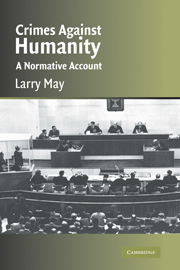Book contents
- Frontmatter
- Contents
- Acknowledgments
- A UNIVERSAL NORMS AND MORAL MINIMALISM
- B PRINCIPLES OF INTERNATIONAL CRIMINAL LAW
- C PROSECUTING INTERNATIONAL CRIMES
- D DEFENSES AND ALTERNATIVES
- 10 Superior Orders, Duress, and Moral Perception
- 11 The International Rule of Law
- 12 Victims and Convictions
- 13 Reconciliation and Amnesty Programs
- Conclusions
- Notes
- Bibliography
- Index
13 - Reconciliation and Amnesty Programs
Published online by Cambridge University Press: 23 November 2009
- Frontmatter
- Contents
- Acknowledgments
- A UNIVERSAL NORMS AND MORAL MINIMALISM
- B PRINCIPLES OF INTERNATIONAL CRIMINAL LAW
- C PROSECUTING INTERNATIONAL CRIMES
- D DEFENSES AND ALTERNATIVES
- 10 Superior Orders, Duress, and Moral Perception
- 11 The International Rule of Law
- 12 Victims and Convictions
- 13 Reconciliation and Amnesty Programs
- Conclusions
- Notes
- Bibliography
- Index
Summary
Many mass crimes, such as genocide or ethnic cleansing, involve criminal acts perpetrated on such a large scale and so gruesomely and methodically executed as to be literally unbelievable. Surely, we hope, humans would not do such things to other humans. If even just some of the crimes reported in Rwanda, Cambodia, South Africa, Guatemala, Nigeria, or the Balkans are true, the very idea of not prosecuting the perpetrators, and of granting them amnesty, seems also unbelievable. Not prosecuting people for these crimes seems to be the ultimate in impunity, allowing people to escape accountability for the worst things they could do to their fellow humans.
In the last chapter, I argued that victims are not owed prosecutions, convictions, and punishment of perpetrators. In this chapter, I will argue that it is sometimes justifiable to employ amnesty programs, instead of trials, as a response to some cases of mass atrocity. I will employ the concept of reconciliation in this attempt to show that criminal trials are not necessarily required, even in horrific cases of mass crime.
I will argue that in some cases, the idea of amnesty to secure peace is not unreasonable. The justification for amnesty, or pardon, is based on the claim that we should look beyond the wrongful act in question to the person's character, to his or her other acts, or, even more importantly, to the societal good.
- Type
- Chapter
- Information
- Crimes against HumanityA Normative Account, pp. 235 - 253Publisher: Cambridge University PressPrint publication year: 2004



